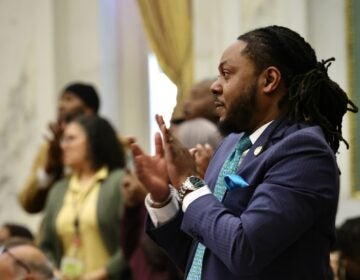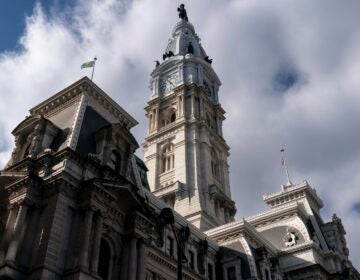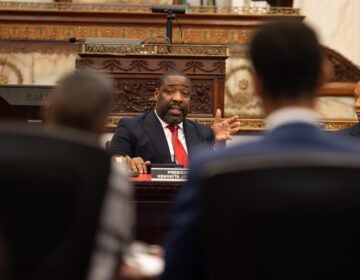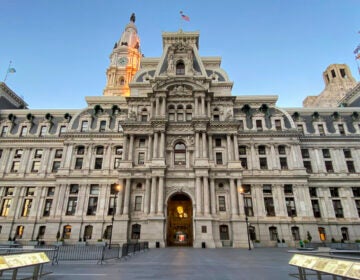Philadelphia City Council weighs small business tax exemption dilemma as some push to double it
Tax relief on the first $100,000 of revenue for businesses in Philadelphia could either be eliminated or doubled in the next city budget.
Listen 0:59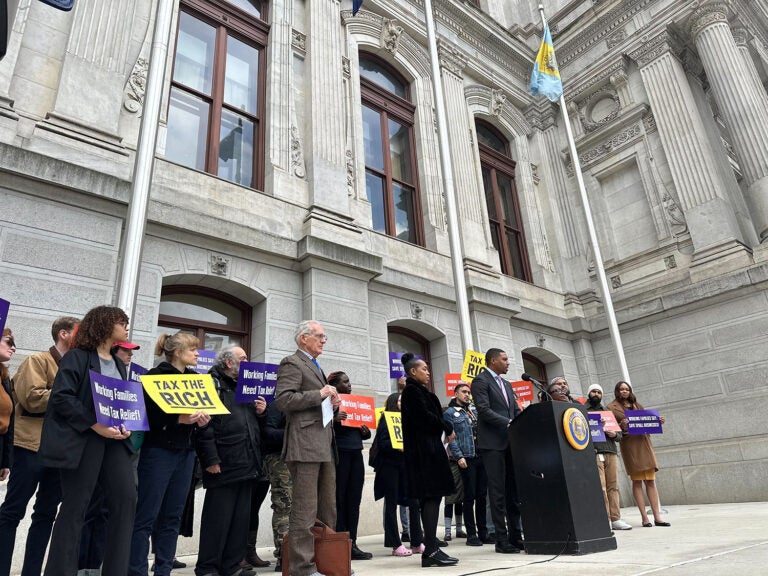
Working Families party members and Philadelphia City Councilmembers Kendra Brooks and Nicolas O’Rourke introduce an alternative business tax plan. (Kristen Mosbrucker-Garza/WHYY)
From Philly and the Pa. suburbs to South Jersey and Delaware, what would you like WHYY News to cover? Let us know!
As Philadelphia city council members combed through Mayor Cherelle Parker’s $6.7 billion budget proposal, several questioned whether it was necessary to eliminate a small business tax exemption while others favored the move.
Since the 2020 tax year, businesses with less than $100,000 in revenue have not been required to file a Business Income and Receipts Tax, or BIRT. Typically, businesses within city limits pay taxes on both gross receipts and net income in addition to a net profits tax.
Parker’s proposal would cut business taxes under BIRT for gross receipts, net income and the city’s wage tax.
Parker blamed an active court case over a business tax refund by Zoll Medical Corp. as a threat to the entire BIRT system and as the reason for the elimination of small business tax exemptions.
The city’s law department cautioned that there is a declaratory judgement against the city’s BIRT system as unconstitutional already, so the city might have to fight for years to the state Supreme Court for a ruling.
Zoll Medical Corp Lawsuit by WHYY News Digital on Scribd
“The exemption is going away because we’ve been advised that it would not withstand a legal challenge,” said Rob Dubow, director of finance for the city of Philadelphia. “In a worst case scenario, the whole BIRT would be declared to be not an enforceable tax.”
To aid small businesses with the transition, Parker proposes earmarking $30 million it would raise from the change to the Department of Commerce for tax preparation help and grants.
City Council President Kenyatta Johnson countered claims by progressives that the city was considering raising taxes on small businesses by eliminating the exemption.
“Doing the settlement, the exemption goes away. Not necessarily raising taxes on small businesses, we didn’t vote as a body to increase taxes,” Johnson said.
Councilmembers Kendra Brooks and Nicolas O’Rourke, who are aligned with the progressive Working Families Party, proposed an alternative tax plan that would double the threshold of the exemption to the first $200,000 of business revenue.
“Meaning a whole new group of small businesses could hold onto that money and reinvest it into their small businesses,” Brooks said. “I think the administration must continue to fight for this exemption to see it through in court before preemptively giving up.”
Councilmember Nina Ahmad questioned whether eliminating the exemption before a final court ruling was prudent if a judgement in favor of the city would make the point moot.
“We all know that changes to our tax system shouldn’t come at the expense of small businesses,” Councilmember Rue Landau said. “I’m concerned with this notion that we’re absolutely, definitely going to lose this lawsuit. I’m one that wants to take the chance and go fight it.”
Those concerns were echoed by local business advocates like Natalia Dominguez Buckley, who serves as the secretary of the board of the Greater Philadelphia Hispanic Chamber of Commerce.
“We’re deeply concerned about the anticipated elimination of the $100,000 BIRT exemption which currently shields the smallest businesses from the burden of Philadelphia’s tax structure,” Dominguez Buckley said.
She estimated that 120,000 small businesses across the city would be subject to paying business taxes if Parker’s budget proposal is approved.
And that those business taxes are paid up front on an annual basis. The chamber asked for quarterly filings instead.
Councilmember Jamie Gauthier even questioned whether Parker’s plan to cut business taxes would improve economic mobility for the city residents and asked for local hiring requirements in exchange for tax cuts.
“The thing that I think I struggle with every year around this is just wanting more certainty that our people will get the jobs,” Gauthier said. “That people who live here, who are living in poverty will get a substantial amount of whatever jobs are created.”
The alternative tax plan proposed by progressives on City Council would also include an expansion of wage tax refunds for low-income workers and introduce a wealth tax.
Under the proposal, individuals earning $33,000 or less and joint filers earning $41,000 a year or less would be eligible for a wage tax refund on average of $275 each.
In addition, the wealth tax would be 0.4% on every $1,000 on stock and bond investments $100,000 and above for city residents.
“For less than 1%, we generate $200 million to give to our people,” O’Rourke said. “Inequality is one of the most urgent moral issues of our time.”
Exclusions to the wealth tax would apply to owner-operated small businesses, education savings accounts, retirement accounts and mutual funds.

Get daily updates from WHYY News!
WHYY is your source for fact-based, in-depth journalism and information. As a nonprofit organization, we rely on financial support from readers like you. Please give today.



